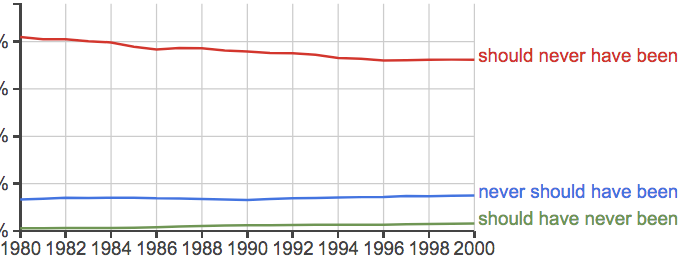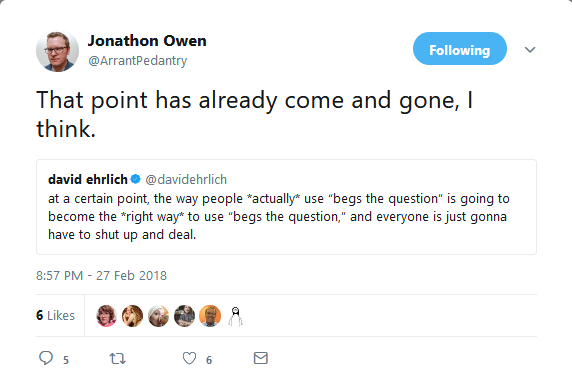Archive for Usage
July 30, 2018 @ 3:50 pm· Filed by Barbara Partee under Ambiguity, Language change, negation, Pragmatics, Semantics, Syntax, Usage, Variation
In late June Lila Gleitman noticed a case of "A is pessimistic that S" meaning that A considers it likely that S will happen/turn out to be the case, and A considers S to be an unwanted outcome. Her example was "I am more pessimistic than I was two weeks ago about the trade war spinning out of control."
We agreed that we would both find it impossible to say "I’m pessimistic that the trade war will spin out of control", but differed on "pessimistic about": in my dialect, but not Lila’s, "A is pessimistic about a Republican victory in the fall" is OK, meaning that A fears that the outcome will be the one she doesn’t want — that there will be or that there won’t be, depending on her point of view.
Lila, by the way, said she could use “pessimistic that” in the case of losing hope in a good outcome: “I am more pessimistic than I was two weeks ago that the prices of stocks will rise.” But I don't think I could use "pessimistic that" there either. (So the original speaker and Lila and I seem to have three different patterns of judgments about "pessimistic that".)
Read the rest of this entry »
Permalink
June 6, 2018 @ 12:13 pm· Filed by Mark Liberman under Idioms, Usage
Vicki Needham and Niv Ellis, "Trump to face lion’s den at G-7 summit", The Hill 6/6/2018:
President Trump will walk into a lion’s den of angry allied leaders at this week’s Group of Seven summit, where he is expected to face a firestorm of criticism over his decision to hit them with steep tariffs on steel and aluminum. […]
Bill Reinsch, a trade expert with the Center for Strategic and International Studies, said Trump is likely to get an earful from the U.S. allies. […]
Reinsch said he expects the summit to be one of the most tense in recent history and said the other six countries are “loaded to bear.”
Read the rest of this entry »
Permalink
June 5, 2018 @ 11:06 am· Filed by Mark Liberman under Idioms, Usage
Alex Isenstadt, "Trump warns supporters about 'really angry' Democrats", Politico 6/4/2018:
President Donald Trump on Monday afternoon marked 500 days in office by grimly warning supporters that Democrats are motivated to turn out for the midterm elections — and that they’re “really, really angry.”
During a national conference call with grassroots supporters to commemorate the 500-day milestone, Trump implored his backers not to become complacent ahead of the November elections because Democrats were determined to roll back his first-term accomplishments.
“It’s very important that they come out now for the midterms. Historically, they tend not to. They get a little complacent, I guess. Something happens and they tend not to. But it’s going to be very important because they are angry, the other side is really, really angry. And they stoop to no lengths. It’s an incredible thing we’re witnessing,” the president said on the 15-minute call, which was organized by the White House Office of Political Affairs.
Read the rest of this entry »
Permalink
May 14, 2018 @ 3:25 pm· Filed by Mark Liberman under Peeving, Usage
A couple of days ago, I wondered why modern English is reluctant to turn adjectives into verbs ("This towel kinds to your skin", 5/12/2018, and Laura Morland commented that "Universal verbing privileges would indeed be the kinder option." We were lamenting the loss of certain kinds of category-bending freedom, but Christopher Beanland wants us to have even less of it ("Smart knows that’s not English – how adland took a mallet to the language", The Guardian 5/14/2018):
It’s taken a millennium and a half for English to develop into a language as rich and complex as a character from your favourite multi-part Netflix drama series – and just a few years for the advertising industry to batter it into submission like a stained piñata at a child’s party.
Baffling slogans have become the new norm in adland. Perhaps Apple laid the foundations in 1997 with its famous Think Different campaign, but things have since gone up a notch: in 2010, Diesel blurted out perplexing offerings such as “Smart had one good idea and that idea was stupid”. Then came Zoopla with its “Smart knows” campaign. Now we’re informed by Ireland’s flag carrier that “Smart flies Aer Lingus”. Who are these people called Smart and how can we avoid sitting next to them on our next flight?
Today’s language-mangling ad campaigns run the greasy gamut from the somewhat confusing “Live your unexpected Luxembourg” to the head-scratching “Start your impossible”.
Read the rest of this entry »
Permalink
May 12, 2018 @ 6:43 pm· Filed by Mark Liberman under Usage, Words words words
From my hotel bathroom in Miyazaki:

This towel makes a lot of bubbles and kinds to your skin.
So, you have a pleasant bath time.
Read the rest of this entry »
Permalink
April 26, 2018 @ 11:48 am· Filed by Neal Goldfarb under Language and the media, Language reform, Prescriptivist non-poppycock, Prescriptivist poppycock, Usage
From Lane Greene at The Economist, "The ban on split infinitives is an idea whose time never came," with boldfacing by yours truly:
GEORGE BERNARD SHAW was once so angry with a subeditor that he complained to the newspaper. “I ask you, sir,” Shaw wrote, “to put this man out.” The cause of his fury? The editor had insisted on “correcting” split infinitives. “Set him adrift and try an intelligent Newfoundland dog in his place,” Shaw fulminated, “without interfering with his perfect freedom of choice between ‘to suddenly go’, ‘to go suddenly’ and ‘suddenly to go’.”
This spring a new edition of The Economist’s style guide is published*. Many of its changes are of a kind only a copy-editor would notice; but on an issue that has set teeth grinding for centuries, it marks a sea-change that Shaw would have appreciated. It says infinitives may be split.
While this strikes a blow for linguistic sanity, it is not an unmixed blessing. The Economist's prohibition of split infinitives within its pages has provided a steady supply of topics for blogospheric descriptivists (especially those with the initials "GKP"), who will now have to find something else to write about.
Economist still chicken: botches sentence rather than split infinitive (Geoff Pullum on Language Log)
No-excuses split infinitive in the Economist (Geoff Pullum on Language Log)
To more than justify the split infinitive (Geoff Pullum on Language Log)
At last, a split infinitive in The Economist (Geoff Pullum on Language Log)
Economist Sticklers trying to bug me (Geoff Pullum on Language Log)
Active seeming: dumb grammar fetishism yet again (Geoff Pullum on Language Log)
Rules that Eat Your Brain (Geoff Pullum on Lingua Franca)
The Economist Should Lighten Up and Split Some Infinitives (Geoff Pullum on Slate)
Led astray by the no-split-infinitives fetish (Gabe Doyle on Motivated Grammar)
To offensively split infinitives (Stan Carey on Sentence First)
Permalink
April 11, 2018 @ 9:15 pm· Filed by Neal Goldfarb under Dialects, Dictionaries, Language and society, Language attitudes, Language teaching and learning, Prescriptivist non-poppycock, Standard language, Usage
One of the most well-known pieces of lexicographic history is the controversy that greeted the publication of Webster’s Third New International Dictionary. Whereas the predecessor of W3, Webster’s Second New etc., had been regarded as authoritatively prescriptive, W3 was condemned in the popular media for its descriptive approach, the widespread perception of which can be boiled down to “anything goes.” (For the details, see The Story of Webster’s Third by Herbert Morton and The Story of Ain’t by David Skinner.)
I recently came across two articles that seem to be largely unknown but deserve wider attention—one by the General Editor of W2 (Thomas Knott), and the other by the Editor-in-Chief of W3 (Philip Gove). Each article is notable by itself because it fleshes out the author’s attitude toward usage and correctness, and does so in a way that undermines the stereotype that is associated with the dictionary each one worked on. And when the two articles are considered together, they suggest that despite the very different reputation of the two dictionaries, the authors’ attitudes toward usage and correctness probably weren’t far apart.
Read the rest of this entry »
Permalink
April 5, 2018 @ 5:06 pm· Filed by Mark Liberman under Usage
From David Denison — Hard working ISA [contrasted with] not hardly working ISA:

David's comment:
This is an ad for an ISA (Individual Savings Account – tax-free for UK taxpayers), pushing the advertiser's Stocks & Shares offering against some other ISA that (presumably) merely pays interest. For me, not and hardly are alternatives before an -ing and incompatible with each other in the sense intended ('hardly at all'), though it's easy enough to find other web examples like it, as well as examples in COCA etc. where not hardly means 'hardly at all'.
Read the rest of this entry »
Permalink
April 2, 2018 @ 5:09 am· Filed by Mark Liberman under Usage
When I read Chris Christie quoted as saying "[I]f Mr. Pruitt is going to go, it’s because he should have never been there in the first place" (e.g. in this article and in this picture caption), the wording "should have never been" struck me as somewhat awkward compared to "should never have been". The third option "never should have been" also seems somewhat better to me. And general usage patterns seem to agree — the COCA corpus has 244 hits for "should never have been" and 125 for "never should have been" vs. 51 for "should have never been", and the Google Ngram viewer shows the same order, with an even larger advantage for "should never have been":

So all three orders are Out There, but "should never have been" is the most common, while Mr. Christie's reported choice "should have never been" is in last place.
Read the rest of this entry »
Permalink
March 22, 2018 @ 8:15 am· Filed by Mark Liberman under Idioms, Usage
Jeff Goodman, "Dan Hurley, front-runner for UConn job, hasn't thought about openings 'for a second'", ESPN 3/18/2018:
"Listen, I could give a crap about who's got an opening anywhere," Hurley said. "I haven't thought about it for a second. I could care less what any other school in the country that's looking for a coach or talks about me on social media — I could give two craps about that. My heart, my mind is with this program and these players that just lost a brutal game after having an amazing last couple seasons, and for me it's easy."
Read the rest of this entry »
Permalink
March 10, 2018 @ 1:04 pm· Filed by Neal Goldfarb under Language change, Peeving, Prescriptivist non-poppycock, Prescriptivist poppycock, Taboo vocabulary, Usage, Usage advice, Variation
At Arrant Pedantry, Jonathon Owen continues the conversation about begs the question (Skunked Terms and Scorched Earth). Citing my previous post Begging the question of whether to use "begging the question", Jonathon describes me as writing that "the term should be avoided, either because it’s likely to be misunderstood or because it will incur the wrath of sticklers." I wouldn't put it that way; I did quote Mark Liberman's statement to that effect, and I did note that I had, in an instance I was discussing, decided to follow that advice, but I don't think I went so far as to offer advice to others.
As it happens, I'm meeting Jonathon for lunch (and for the first time) later today. I'm in Utah, where the law-and-corpus-linguistics conference put on by the Brigham Young law school was held yesterday, near where Jonathon lives. So I will have it out with him over the aspersion he has cast on my descriptivist honor.
Despite my peeve about Jonathon's post, it's worth reading. He discusses the practice of declaring a word or phrase "skunked". As far as I know, that is a practice engaged in mainly by Bryan Garner, who offers this description of the phenomenon of skunking: “When a word undergoes a marked change from one use to another . . . it’s likely to be the subject of dispute. . . . A word is most hotly disputed in the middle part of this process: any use of it is likely to distract some readers. . . . The word has become 'skunked.'”
Jonathan writes, "Many people find this a useful idea, but it has always rubbed me the wrong way." He explains:
Read the rest of this entry »
Permalink
February 28, 2018 @ 6:54 pm· Filed by Neal Goldfarb under Language attitudes, Language change, Peeving, Prescriptivist non-poppycock, Usage, Usage advice, Variation

The tweets above have extra salience for me, because I used begs the question in the traditional way ('assumes the answer to the question in dispute') in my most recent post on LAWnLinguistics. I did so with some trepidation—not because I was worried that someone would think I was using the phrase wrong, but because I was worried that someone would think I was using it in the 'raise the question' sense and wonder what the question was that I thought was being begged.
Read the rest of this entry »
Permalink
February 2, 2018 @ 5:35 pm· Filed by Mark Liberman under Syntax, Usage, WTF
At some point in the recent past, after a few long and fuzzy quasi-days checking annotations for the DIHARD challenge, I found myself dozing off while re-reading a random e-book that turned out to be Charles Stross's Halting State, and was caught short by this sentence:
They call this place the Athens of the North — there’s got to be something you can do by yourself on a summer night, hasn’t there?
I thought to myself, "That's got to be wrong, doesn't it?"
Read the rest of this entry »
Permalink



